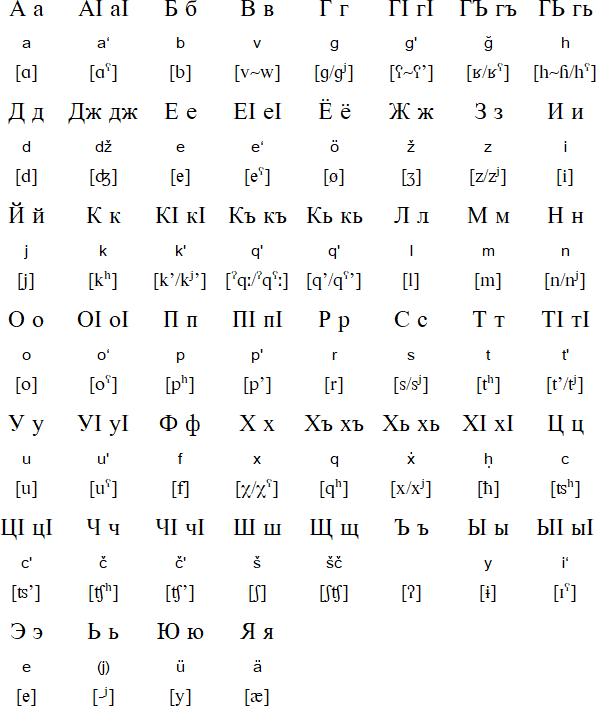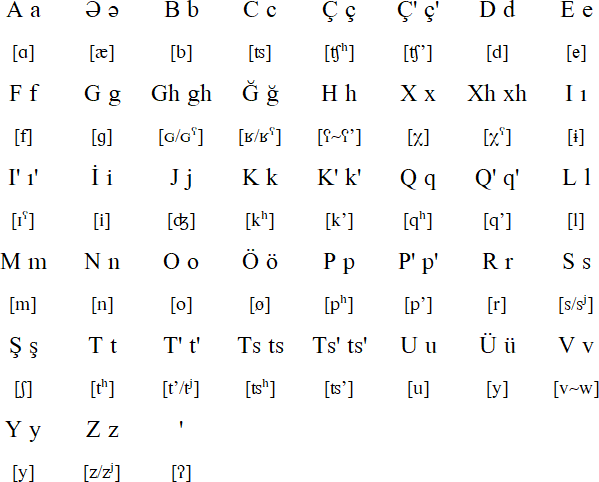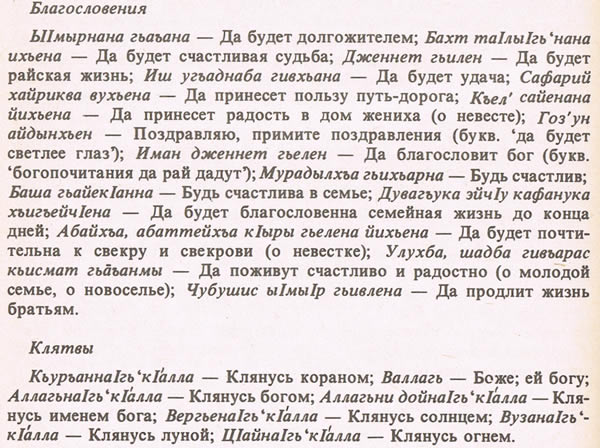Tsakhur is a northeast Caucasian language spoken in northern Azerbaijan and in southwestern Dagestan in the Russian Federation. In 2011 there were about 11,700 speakers of Tsakhur in Azerbaijan, and in 2010 there were about 10,600 Tsakhur speakers in Russia. The language is named after a village in Dagestan where there is a majority of Tsakhur speakers.
Tsakhur was first documented in 1895 by Roderich von Erckert, and a grammar was published in 1913 by Adolf Dirr. A written form of Tsakhur was developed in the 1930s and the language was taught in primary schools until 1938. It was reintroduced in 1989.
In Azerbaijan Tsakhur is written with a version of the Latin alphabet, and in Dagestan the Cyrillic alphabet is used. Attempts have been made to write the language in the Arabic script since the 11th century.
Tsakhur is taught in primary schools in Dagestan and Azerbaijan, and there are some newspapers and radio broadcasts in the language,which has no official status.


Download alphabet charts for Tsakhur in Word or PDF format

Благословения & Клятвы (Blessings & Oaths)
Source: Г.Х. Ибрагимов, Цахурский язык, Академия наук СССР, Москва – 1990.
Sample text supplied by Wolfgang Kuhl
Information about Tsakhur | Numbers
Information about Tsakhur language and people
http://en.wikipedia.org/wiki/Tsakhur_language
https://ru.wikipedia.org/wiki/Цахурский_язык
http://en.wikipedia.org/wiki/Tsakhur_people
http://www.ethnologue.com/language/tkr
Aghul, Akhvakh, Andi, Archi, Avar, Bagvalal, Batsbi, Bezhta, Botlikh, Budukh, Caucasian Albanian, Chamalal, Chechen, Dargwa, Godoberi, Hinukh, Hunzib, Ingush, Kaitag, Karata, Khinalug, Khwarshi, Kryts, Kubachi, Lak, Lezgian, Rutul, Tabassaran, Tindi, Tsakhur, Tsez, Udi
Abaza, Abkhaz, Adyghe, Aghul, Akhvakh, Akkala Sámi, Aleut, Altay, Alyutor, Andi, Archi, Assyrian / Neo-Assyrian, Avar, Azeri, Bagvalal, Balkar, Bashkir, Belarusian, Bezhta, Bosnian, Botlikh, Budukh, Bulgarian, Buryat, Chamalal, Chechen, Chelkan, Chukchi, Chulym, Chuvash, Crimean Tatar, Dargwa, Daur, Dolgan, Dungan, Enets, Erzya, Even, Evenki, Gagauz, Godoberi, Hinukh, Hunzib, Ingush, Interslavic, Itelmen, Juhuri, Kabardian, Kaitag, Kalderash Romani, Kalmyk, Karaim, Karakalpak, Karata, Karelian, Kazakh, Ket, Khakas, Khanty, Khinalug, Khorasani Turkic, Khwarshi, Kildin Sámi, Kili, Komi, Koryak, Krymchak, Kryts, Kubachi, Kumandy, Kumyk, Kurdish, Kyrgyz, Lak, Lezgi, Lingua Franca Nova, Lithuanian, Ludic, Macedonian, Mansi, Mari, Moksha, Moldovan, Mongolian, Montenegrin, Nanai, Negidal, Nenets, Nganasan, Nivkh, Nogai, Old Church Slavonic, Oroch, Orok, Ossetian, Pontic Greek, Romanian, Rushani, Russian, Rusyn, Rutul, Selkup, Serbian, Shor, Shughni, Siberian Tatar, Sirenik, Slovio, Soyot, Tabassaran, Tajik, Talysh, Tat, Tatar, Teleut, Ter Sámi, Tindi, Tofa, Tsakhur, Tsez, Turkmen, Tuvan, Ubykh, Udege, Udi, Udmurt, Ukrainian, Ulch, Urum, Uyghur, Uzbek, Veps, Votic, Wakhi, West Polesian, Xibe, Yaghnobi, Yakut, Yazghulami, Yukaghir (Northern / Tundra), Yukaghir (Southern / Kolyma), Yupik (Central Siberian)
Languages written with the Latin alphabet
Page last modified: 23.04.21
[top]
You can support this site by Buying Me A Coffee, and if you like what you see on this page, you can use the buttons below to share it with people you know.

If you like this site and find it useful, you can support it by making a donation via PayPal or Patreon, or by contributing in other ways. Omniglot is how I make my living.
Note: all links on this site to Amazon.com, Amazon.co.uk
and Amazon.fr
are affiliate links. This means I earn a commission if you click on any of them and buy something. So by clicking on these links you can help to support this site.
[top]